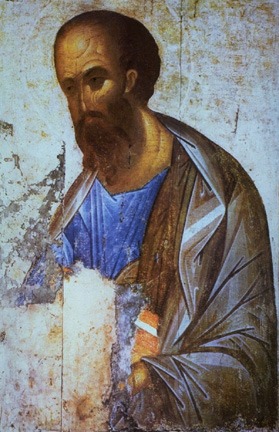For you were called to freedom, brothers and sisters; only do not use your freedom as an opportunity for self-indulgence, but through love become slaves to one another. For the whole law is summed up in a single commandment, “You shall love your neighbor as yourself.” If, however, you bite and devour one another, take care that you are not consumed by one another. Gal. 5:13-15.
Today’s reading from the Daily Office offers us a glimpse of St. Paul’s notion of Christian freedom. Earlier in the passage, Paul says that Christ has set us free for freedom. Gal. 5:1. Paul notes that Christ has freed us, not only from the yoke of the Law, but also from sin itself.
Generally, we think of being freed from some sort of difficulty (financial debt, addiction, or a broken heart). Jesus has not only freed us from the law, He has freed us for a new relationship with the Father. Thus, St. Paul tells us our new freedom does not liberate us for self-gratification. If that were so, we would simply trade one set of chains for another.
St. Paul’s next move is somewhat surprising and offers us one of those paradoxes that we so often encounter in Christianity (a virgin birth, Jesus as fully divine and fully human, loving our enemies, etc.). Paul tells us that Christ brought us liberty so that we might become “slaves to one another.” We might well ask, “What kind of freedom is that?”
St. Paul argues that the contrary view of freedom (absolute liberty devoted to selfish goals) leads to an “eat or be eaten” way of living. He says, “If, however, you bite and devour one another, take care that you are not consumed by one another.” His language here conjures up images of wild animals tearing each other apart. (I’ve certainly been present at dinner parties which would suggest that Paul was right.) We have too often demonstrated the capacity for greed, humiliation, violence and making a way for ourselves on the backs of others. Paul is right; we consume each other.
St. Paul offers us another way: the Way of the Cross. He tells us “the only thing that counts is faith working through love.” Gal. 5: 6. Paul believes this new relationship with God compels us toward a life of charity and compassion. This new relationship with Christ draws us into a life of serving each other. There, we will encounter the freedom to be the sort of people God intended us to be. Stated another way, Jesus freed us to become the Church, His mystical body. Beyond compliance with a set of rules and beyond the “righteousness trap”, St. Paul calls us to a life of devoted service to God’s children.
That life of devotion, of self-denying love, constitutes the essence of the Christian life. Saint Paul does not see a life in community, spent in the service of God’s children, as the best sort of Christian life. Rather, he sees it as the only life than can authentically be called “Christian.”
God watch over thee and me,
James R. Dennis, O.P.
© 2012 James R. Dennis



Yes, this is truth. Completely. Thank you, Linda
Linda,
I hope it sets us free.
God’s blessings on you and your house,
Br. James
Good words Br. James. The post reminds me that we (more honestly, I) often confuse autonomy and freedom. Autonomy is getting to do what I want. Freedom is about being and becoming. Autonomy is about individualism whereas freedom is about personhood and relationship. In Christ we are freed, not to do whatever we want, but to be and become God-like.
Peace,
Mike+
Thank you, mi Padre.
The distinction between freedom and autonomy is indeed important. We are freed to and for theosis.
Pax Christi,
Br. James
Thank you.
Alethea,
Please pardon my delaying responding. I’m traveling and it’s not always easy to stay connected. You see, as always, most welcome. Thank you for your regular encouragement and support.
God bless,
Br. James
In the end, there are only our spirits that remain. Common sense should tell us that (although many of us don’t use that God-given grace nearly enough). We come into this life with nothing except our spirits and it is our duty and responsibility to grow those spirits during this brief human life. What will we take with us into the afterlife? As near as I can tell, we leave all our material possessions and, if we are lucky, a few loving memories, behiind. A life in service to each other is just about the only way that will grow our spirits with honest integrity. Children are the only beings who win exclusion. Their service to us is their innocence, charm, and wonder.
Dear Barbara,
I think that’s just so. We grow spiritually through our service to God’s children. In that,we are integrated back into the Source of our lives. Thank you for your thoughts, and for your gentle spirit.
God’s great peace on you and your house,
Br. James
This article inspires me to go back to Paul’s writings. It is filled with Hope. Wonderful stuff.
Des,
I’m not especially a Paulinist (and am very glad he wasn’t my bishop), and so when he says something that resonates with me, I try to pay careful attention to it. I hope all is well with you.
Peace on you and your house,
Br. James